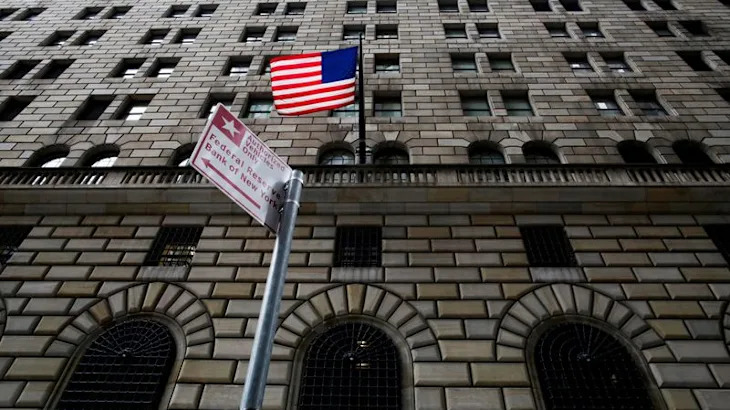(Bloomberg) -- The Bank of England is about to grapple with one of the thorniest decisions since it began unwinding crisis-era stimulus in 2022 as it confronts a year of unusually high bond redemptions.
Governor Andrew Bailey and his colleagues will decide this month whether to keep the run-off of their portfolio bought up through years of emergency purchases at a steady pace of £100 billion (€132 billion), or whether to increase that amount. That would respond to a glut of maturing bonds and stop a drop in gilt disposals.
While investors largely expect the UK central bank to stick with a stable level of balance-sheet reduction, economists at Deutsche Bank AG and Citigroup Inc. are among those warning that officials may accelerate it. Former policymaker Michael Saunders sees merits either way, saying the BOE may “go for something like £115 billion to avoid a sharp drop in gilt sales.”
That decision on so-called quantitative tightening will be crucial for investors navigating a backdrop that already features the second-largest UK bond issuance on record. Chancellor of the Exchequer Rachel Reeves will be watching closely to gauge the extent of her available fiscal firepower for the Labour government’s first budget in October as she seeks to plug a £22 billion black hole in the public finances.
The Monetary Policy Committee will vote on the speed of gilt sales at its decision on Sept. 19 ahead of the next year of QT beginning in October. Bailey and other officials are trying to normalize policy to build up ammunition for future crises and reduce the interest-rate risk it carries.
So far, a portfolio of corporate and government debt bought up under quantitative easing to support the economy during the financial crisis and the pandemic has already shrunk from £895 billion down to £688 billion, and is now composed solely of gilts.
The BOE has achieved that through a mix of actively selling bonds and stopping reinvestments when they reach their redemption dates. But a sharp increase in gilts maturing in the next year — spiking from the usual pace of £50 billion to £87 billion — leaves policymakers with a stark choice: either offload far fewer than usual, or boost the overall runoff target to shrink the balance sheet more drastically.
By sticking with a £100 billion pace of reduction, its bond sales would need to plummet from £50 billion a year currently to around £13 billion. While that’s the outcome predicted by investors in a survey by the central bank, analysts aren’t so sure. Their predictions range from a faster BOE wind-down to gilt disposals stopping altogether.
Sanjay Raja, chief UK economist at Deutsche Bank, is one forecaster anticipating a quicker BOE run-off to prioritize continuity in its bond sales, since that’s more important for market impact. He points to officials’ previous guidance, which in August promised to keep disposals “relatively gradual and predictable.”
“We think £40 billion of sales over the 12-month QT program is perfectly reasonable with avoiding any volatility in the market,” he said. “It makes little sense to alter the sales program drastically only to kick-start it again in a year’s time.”
Strategist Jamie Searle at Citigroup expects a target of £120 billion, but warned the BOE could even go as high as around £140 billion.
Crucial to that call is officials’ analysis last month that QT continues to have a minimal impact on both financial markets and the broader economy, a point also noted by Bank of America strategists including Agne Stengeryte. Her team forecasts £100 billion, but says the BOE’s relaxed tone on QT impact suggests risks of more.
To be sure, some economists are war-gaming the opposite: an even smaller QT target. One reason for that is the prospect that selling too many bonds could overlap with officials’ attempts to wean markets off their bloated balance sheet.
The BOE wants to shift from a system where banks buy assets in exchange for cash-like reserves, toward repo operations — lending cash against collateral. Bailey has told markets to prepare for that as he looks to disentangle the central bank from the fiscal impact of QE and QT after huge losses increased political scrutiny.
Imogen Bachra, head of economics and markets strategy at NatWest Markets, cites a surge in banks’ use of the weekly short-term repo facility to as high as £40 billion from as little as £700 million at the start of the year as a motivation for the BOE to end gilt sales altogether.
Otherwise, she says the central bank risks rushing toward the transition sought by Bailey at a time when officials also worry that not all their repo facilities are “effective and attractive enough.”
Another consideration is the overall size of the balance sheet. While Sam Hill, head of market insights at Lloyds Bank Commercial Markets, sees the case to raise the pace of wind-down to keep bond sales stable, he cautions that the end of a pandemic-era business-support program will automatically shrink the BOE’s assets in the next year.
“Bailey could do £100 billion of QT and still tell Parliament that £200 billion of balance sheet reduction over one year is solid progress,” he said. “It doesn’t seem obvious that now is the time to go harder.”
Whatever happens, the BOE’s lack of guidance about a change in the target is one reason to expect no change, according to Saunders, a former BOE rate-setter who is now a senior policy adviser at Oxford Economics.
“They would have nudged market expectations of QT higher with a speech, but they have not done so,” he said.
The decision will be crucial to Reeves’s budget, as the Treasury is forced to cough up for multi-billion pound losses from QE and QT.
The BOE’s plans could help or hinder the chancellor as she tries to contain the country’s rising debt mountain while facing a backlash over cuts to spending on measures such as winter fuel subsidies for pensioners.
--With assistance from Rachel Evans.





